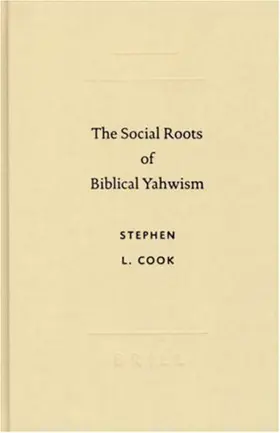

The Social Roots of Biblical Yahwism (Studies in Biblical Literature) (Studies in Biblical Literature (Society of Biblical Literature))
Pages
312
Publisher
Brill
Published
1/1/2005
ISBN-13
9789004130555
Sure to provoke discussion and debate as it offers a unique approach to some old and perplexing issues in the history of ancient Israel and its religion, Cook’s study is a bold new proposal for synthesizing the social history of Israel’s religious traditions. Among the many "Yahwisms" coexisting in ancient Israel was an initially small minority stream of theological tradition composed of geographically and socially diverse groups in northern and southern Israel. These groups shared a religious commitment to a covenantal, village-based, land-oriented Yahwism that arose before the emergence of Israelite kingship. It eventually rose to dominance, and its theology provided robust resources for dealing with the Babylonian exile. It thus came to occupy a prominent place in the present canon of the Hebrew Bible. Cook combines detailed study of biblical texts with a carefully constructed social-scientific method and body of data to argue for the early origins of biblical Yahwism. This book is written to be accessible to lay readers and also of significant interest to Hebrew Bible students and specialists.
Reviews
Atlanta: Society of Biblical Literature; Leiden: Brill, 2004. Pp. xii + 310. Paper/cloth. $39.95/$133.00. ISBN 1589830989/9004130551. Kenton Sparks Eastern University St. Davids, PA 19087 While the Hebrew Bible is not easily construed as a univocal theological voice, its canonical shape reflects a strong dose of what E. P. Sanders has described as �monotheistic, covenantal, nomism.� Indeed, th e Bible presents this brand of Judaism�let us call it �biblical Yahwism��as both norm ative and very ancient, going back even to the Hebrew patriarchs themselves. Modern biblical scholars are predictably and understandably reluctant to comment about whether biblical Yahwism should be construed as Jewish orthodoxy in any metaphysical sense, but they have expressed serious questions about the historical accuracy of this canonical portrait of Israelite religious history. Over the course of the last century, biblical scholars have assigned the emergence of biblical Yahwism to increasingly later periods. What the Bible ascribes to the patriarchs and Moses, modern scholars would date to the late monarchy, or, more often, to the exilic and postexilic periods. The resulting history of Israel�s religion tends to look like this: Israel and its Yahwism emerged from the religious and social matrix of second-millennium Palestine. Early on, Israel�s devotion to Yahweh was henotheistic in character, but this henotheism was gradually supplanted by, or developed into, a more exclusive variety of mono-Yahwism. According to scholars, this three-stage evolutionary process�from polytheism to henotheism to monotheism�was mirrored in the development of Israel�s theological ideas (e .g., �covenant�) and also in the development of its religious institutions (e.g., the sacrificial cult).
[Full Review]
